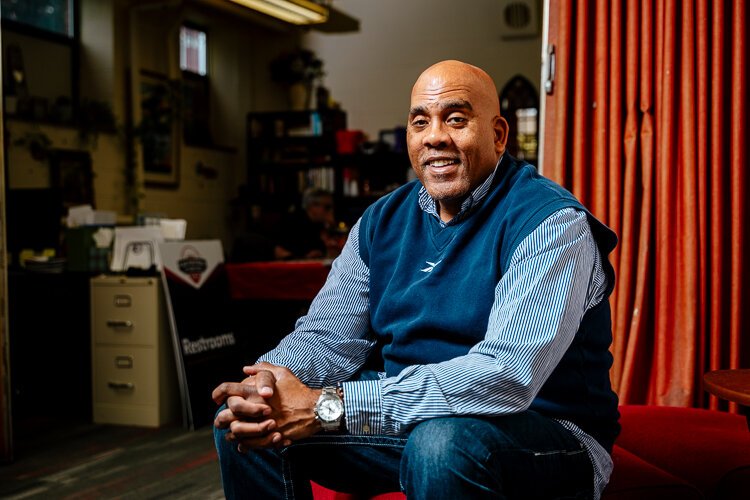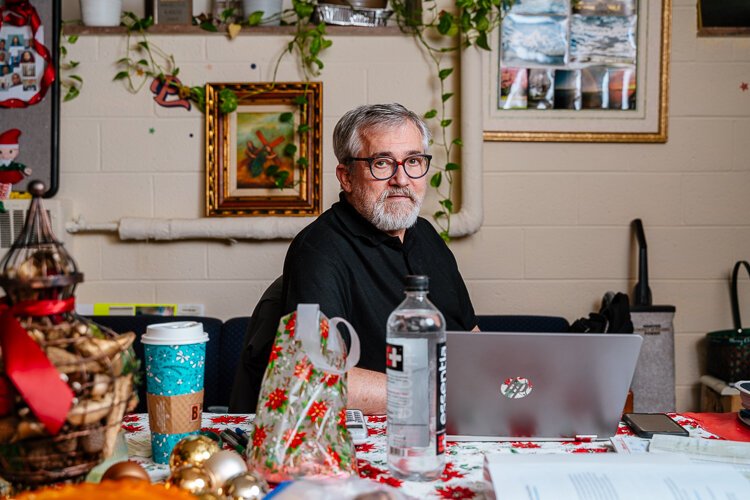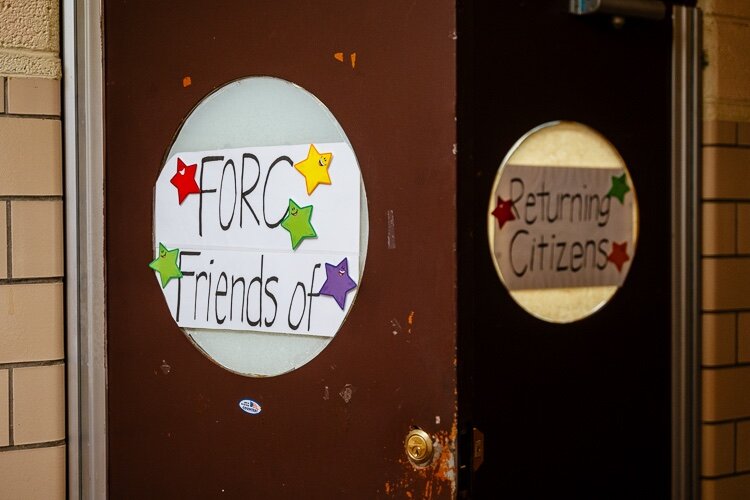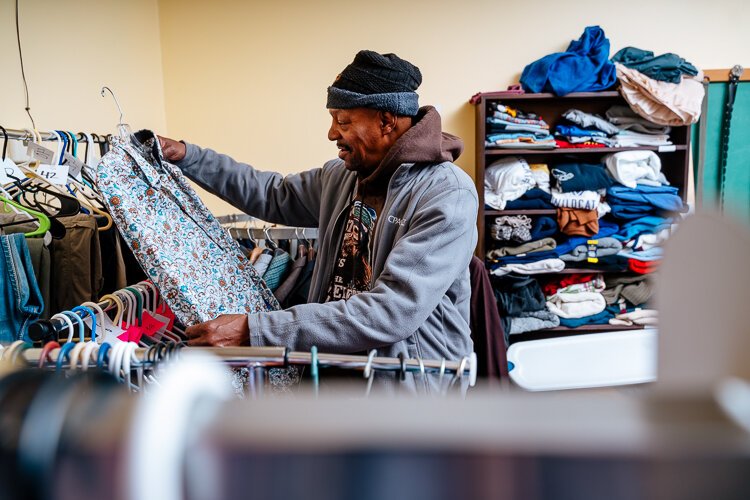“Society tells me that I can’t live anywhere and people want to extort me.”
The struggles are many for people leaving the prison system, but Friends of Returning Citizens (FORC) is there to help for juvenile lifers and others on probation, paroled or recently released from a Michigan prison.
When Tim Kane was released from prison in April 2020, he had a list of important things he needed. There were the “usual suspects” of a home, job, food and clothes. Topping the list was something most people would not expect: a hug.
“More than anything, I just really wanted human connection and to be around people,” Kane says. “The longing to just hug someone was so deep.”
Unfortunately for Kane, his dreams were brought to a sudden halt just three days after his release. He was admitted to the Henry Ford Hospital and was treated for COVID-19 for 45 days.
“It was a world that was wrapped in plastic, and I couldn’t hug anyone because everyone had to be isolated,” he says. “It was a lot like being in a different kind of prison.”
It didn’t take Kane long to become keenly aware that his experience is similar to other returning citizens, regardless of whether or not they are released during the midst of a global pandemic, there are societal roadblocks to forging a new life. Furthermore, serving time comes with a bad rap.
“Too often society holds returning citizens at arm’s length,” he says. “Forget about second chances. Never mind a hug.”
Today, Kane is the office manager for Friends of Returning Citizens (FORC). A program of the Detroit Catholic Pastoral Alliance, FORC assists juvenile lifers (people discharged after serving life sentences for crimes committed when they were younger than 18) and others on probation, paroled, or recently released from prison in the State of Michigan.
Its core offerings include clothing, housing referrals, hygiene items, employment, volunteer opportunities, and a monthly support group. FORC is also a growing voice for criminal justice reform.
“Inmates come out with nothing. And, if they’ve been in for 30 years or so, then all of their people are dead, too,” Kane says. “They come out with nothing and are expected to do everything. At FORC, they get help and encouragement from people who know their needs.”
Like Kane, FORC’s founders, Craig Whilby and Jamil Allen, are former inmates. Both were juvenile offenders who served 30-plus years in prison. The pair launched FORC in 2020 and were able to officially open their doors last September after the COVID-19 pandemic ended.
Located in the basement of St. Elizabeth Community Center at 3127 E. Canfield St., the organization is open Mondays, Wednesdays and Fridays from 10 a.m. to 2 p.m. Returning citizens are welcomed by Kane, who describes himself as “the greeter, helper and comrade.”
“The system does not prepare you for society, so we wanted to find a way to help men and women coming out of prison find ways to survive,” Whilby says.
To help people understand what returning citizens go through, he suggests looking at the vulnerability of an infant child.
“What do you know as a baby? You know nothing of the world,” he says. “You don’t know your name, where you are going, and where you’ll end up.”
Building a lighthouse and a lifeline
Terrance Carey, a returned citizen for five years, ended up at FORC’s doors after he says another organization told him to “try his luck” elsewhere.
“Honestly, even though I came back to a family support system, it was like having a piano drop on me out of nowhere,” the 45-year-old says about trying to find stability. “The people at FORC were willing to help me though. They can’t do everything to help you get straight and situated overnight, but you can always turn to them.”
Kane shares that most clients are word-of-mouth referrals. If FORC can’t directly help an individual, he will work to maintain a connection with the returning citizen as he and the cofounders try to connect them with needed resources.
“Imagine being a 62-year-old man trying to get Medicare when you’ve never worked a day in your life,” Kane says. “We have two guys who are waiting six months for a [Medicare] resolution. How can we help them in the meantime?”
While he navigates his future, Carey says it’s not just tangible things, like a bus pass, that have made his relationship with FORC impactful. It’s having a safe place to talk to people who understand the specific obstacles he faces in looking for jobs and a place to live.
“I had made up my mind that I was not going back to prison and that I was going to do something good with my life,” he says. He landed a job at a manufacturing plant working 84 hours a week, and didn’t miss a day of work in 10 months. “I did nothing but work and sleep.”
One day he needed to buy some essentials and realized he hadn’t checked his bank account in some time. Carey was shocked to discover he had saved close to $10,000.
“I called the bank four different times because I thought it had to be a mistake. But it wasn’t. I was living with my auntie and thought I should get my own place,” Carey recalls. “It didn’t take long for reality to hit, though. Not everyone believes in second chances for juvenile offenders.”
He recalls meeting all the criteria for a particular housing application but being told by the management that his background made them nervous. Another landlord originally turned him down due to his background, but then called back and said he would “overlook his past” if Carey paid him $1100 a month – instead of the advertised $850 monthly rental fee.
“I was flabbergasted,” he says. “I spent 20-plus years in prison striving to be a better person, and then I come out and work and pay taxes. But, now society tells me that I can’t live anywhere and people want to extort me.”
Opportunities for change
Raising awareness of former inmates’ discrimination and stigma is an essential part of FORC’s work. The 3-person team – supported by 11 board members and a swath of student volunteers from the University of Detroit Mercy – is a growing voice in the fight to end unjust convictions and works within the state’s legislative process to create fair policies and practices. On the organization’s radar is the Second Look bill package currently before the legislature that would end life sentences without the possibility of parole for juveniles.
Should the bill pass, FORC wants to be prepared to help more people. Thus far, the group has been buoyed by the donations of several individuals and three mini-grants (two from the Sister Servants of the Immaculate Heart and one from the Congregation of St. Joseph).
The organization is currently fundraising until September with a $38,000 goal and is currently seeking a grant writer to help them along the way.
Kane, who has been at the forefront of rallying financial support, shares that FORC is seeking grants for cell phones and basic computer know-how for returnees. The idea is to help clients more easily find and apply for jobs and apartments online, a skill that most folks take for granted.
“There needs to be a bigger catch basin for men and women coming out of prison who might fall through the cracks without proper support,” he says. “We need money to give people the knowledge and tools to not reoffend and stay on the right track.”
Better support for returnees means a better society
Kevin Boyd, who served about 19 years in prison, doesn’t know what he would have done without FORC’s support – particularly on the employment front.
“When I came out I was anxious and needed a lot of things explained,” he says. “Just having someone tell me that there are other people who also couldn’t find a job made me less scared.”
Applying for jobs online has been challenging for Boyd, who is now 59, as it has often meant “less humans in the equation.” He’s been rejected numerous times due to background checks.
“There’s zero opportunity to meet with someone to explain my past and how I bettered myself while I was away,” he says.
In-person job fairs and interviews have been frustrating, too, as many potential employers have flatly told him that they don’t hire returning citizens. Boyd recalls one interview where he had to speak from his heart. He told the potential employer that with such practices, they were missing out on hiring smart, hardworking people. “I spent 17 years reading books and have a good work ethic. Still, many people won’t give me a chance to tell them what I can offer,” he says. “Can’t they find one redeeming thing about me? No, they just mark me off as less than human.”
Whilby stresses that changing society’s mindset about returning citizens will take time. Having experienced struggles themselves is why he and Allen wanted to create a safe and uplifting place like FORC.
“Someone who has taken a life can’t come out of prison and redeem themselves by giving a life back. But, they can serve their time and return to be a productive and positive member of society,” Whilby says. “We’re not just giving people toiletries and bus passes; we’re working to make a safer, healthier and happier society for everyone.”
Resilient Neighborhoods is a reporting and engagement series examining how Detroit residents and community development organizations work together to strengthen local neighborhoods. It’s made possible with funding from The Kresge Foundation.








